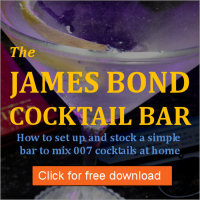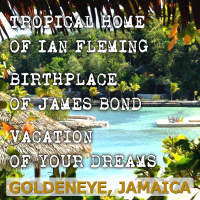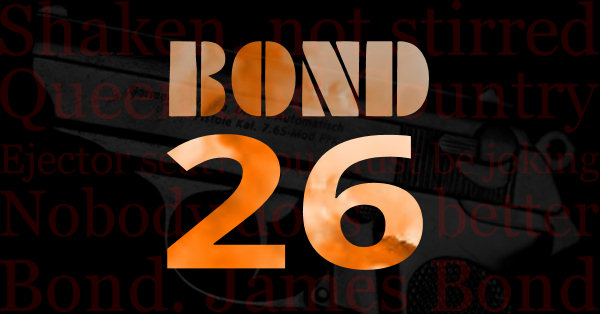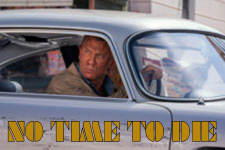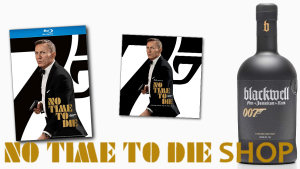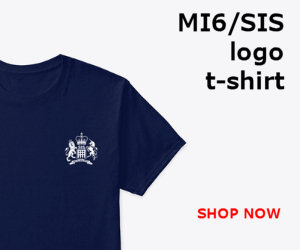Professional musician Tim Mottershead recently attended “Bond and Beyond”, a concert given to celebrate the music from 50 years of James Bond films. At the concert the results of a poll to discover the nation’s favourite 007 themes was also revealed.
I travelled by metro link to Salford Quays, which with the Lowry Theatre, Imperial War Museum North, and now MediaCity on adjacent banks of the Manchester ship canal is surely one of the most spectacular modern developments in the British Isles, and bids fair to be considered as a location for a future Bond film.
On arrival I was mistaken for an interviewee and given the appropriate security pass (such is the life of a secret agent) before being correctly issued with the serial number with which I would gain access to the concert: Double-O One! The concert was given under the banner Friday Night is Music with music performed by the BBC Philharmonic conducted by Robert Ziegler, with guest vocalists.
From my vantage point in the centre of the auditorium I had a clear view of an extremely large orchestra suggesting we were in for something a little bit special and the next few hours proved to not contradict that expectation. In addition to a first-rate musical content, there was also a real interest in the material, a well researched commentary, coupled to a genuine chemistry and sparkling repartee between the two hosts and film chums Mark Kermode and Simon Mayo (although not dressed up as Bond and Bolfeld as per the photo shoot for the Radio Times) who at various points reminded us that they have been together for 11 years. One almost wondered if they might be coming to a nearby theatre, starring in Neil Simon’s The Odd Couple!
In celebration of 50 years of Bond films, the concert titled presented Bond film themes together with music associated with other spies from small and big screen, and from radio. Another point of interest would be to reveal, live on air, the results of a poll to discover the nation’s favourite Bond theme. Following brief a discussion of the significance of the pre-title title sequence, the obvious item opened the concert: Monty Norman’s James Bond Theme in the arrangement by John Barry, which at various points throughout the show was referred to as the legally correct designation. In a close piece of the attention to detail, the films’ famous opening sequence where the circles move across screen from left to right before the appearance of the gun barrel, with Bond walking from right to left, were approximated by spotlights moving in a similar fashion at the back of your auditorium. Having attended live performance of film music before and been slightly disappointed, what impressed in this rendition were the depth, width, and density of sound. The sound was like Bond himself: confident, self-assured, and completely at ease in his own professional role. Indeed conductor Robert Ziegler had earlier characterised the James Bond sound as glamorous, exotic, dangerous, and thrilling.
Having heard the James Bond Theme complete, it was then deconstructed into its component parts with live orchestral extracts whilst Simon Mayo interviewed various members of the orchestra. The first extract was the familiar opening rising and falling background motif played just by the violins. In conversation with Simon Mayo, violinist Julian Gregory characterised this as revealing 2 sides to Bond: the gritty violent side and the opulent luxuriant side.
We then heard this combined with the rest of the orchestral backing including percussion. Whilst the extract was being played Simon Mayo walked round to interview guitarist Steve Smith, but in an Eric Morecambe/Mr. Preview type moment found the music had ended before he reached the appointed spot (but he didn’t pursue the joke). The conversation centred on the difficulties of recreating the sound of the amplifiers and equipment of 50 years ago, when Vic Flick of the John Barry Seven did the honours. We first heard the classic guitar riff faithfully reproduced played alone, then accompanied by the rest of the orchestra.
Mayo’s next port of call was the brass section and a quick interview with trumpeter Jamie Prophet, where we heard the famous (Double-O) Seven note theme, firstly on its own, then with the orchestral backing. We then heard a brief recap of the final section of the piece played by the orchestra as a whole, with Mayo amusingly calling out the score rehearsal numbers from which the extracts commenced.
One of Bond’s forerunners was Dick Barton Special Agent, with his feats of derring-do depicted by his theme music The Devil’s Gallop; which the presenters commented left the BBC mentioned out of breath. There also mentioned the ignominious fate which befell Barton after a total of 771 radio episodes: he was replaced by The Archers! Alistair MacLean’s wartime espionage thriller Where Eagles Dare was represented by Ron’s Grainer’s sombre yet determined theme, followed by with a quick impression from Kermode of Richard Burton’s finest line from the film (forget Shakespeare or Dylan Thomas): ‘Broadsword calling Danny boy’! We also heard Henry Mancini’s slick up-tempo theme tune to the Paris-set spy caper Charade starring Cary Grant and Audrey Hepburn.
One surprise was that OHMSS hadn’t actually featured highly in the polls [see below] and was therefore only included (‘undemocratically’ as Simon Mayo pointed out) at the insistence of Mark Kermode. Kermode spoke of first hearing this music on an album of Bond themes played by Geoff Love and his orchestra, even before seeing the film, and being knocked out by it, which was exactly my own experience. So we were lucky the theme was included, if unfortunate that it was presented bereft of its chordal introduction which more than any other part demonstrates John Barry painting the character in broad brush strokes because of his belief that George Lazenby was ‘hardly Laurence Olivier’. A less significant omission was Barry’s early pioneering use of the Moog synthesiser, which at the time added modernity to the sound without significantly contributing to its overall character.
The concert also included an example of the contribution made to the Bond series by recent composer David Arnold. Whereas it would have been good to have heard a gutsy version of You Know My Name from Casino Royale, we were instead treated to instrumental City of Lovers (from the same film) which features a touching piano solo reference to Vespers theme. Personally I would have preferred to have heard what is perhaps David Arnold’s finest hour: the music which accompanies the ‘night at the opera’ scene from A Quantum of Solace, which makes excellent uses of John Barry’s famous ‘layering technique’ and presents a different musical backdrop to accompany the actual opera that is taking place at the time, as Bond identifies and exposes the some of the criminal entourage of the shadowy Quantum organisation (though the slippery Mr White again eludes capture) and the violent mayhem that ensues.
During the programme the presenters received the following message “So great to hear my late father’s music through which he lives on” from Suzy Barry. How appropriate then that the interval broadcast a previously 2001 interview between John Barry and Paul Sexton. Barry reminisced on his early career telling how the John Barry Seven started out playing cinemas in the York area owned by his father (with Barry’s early appearance not on trumpet but as vocalist, a course he declined to pursue, even as a hobby).
He went on to relate first break arranging music for Adam Faith and the consequence use of one of the instrument arrangements as the theme tune to Juke Box Jury. He got onto how he came to be in the Bond movies and how his role gradually widened from musical arranger in Dr. No, to the writing of the score (but with a title song by somebody else) in From Russia With Love, to being responsible for the whole thing in Goldfinger (making it a much more integrated procedure). Regarded by many as one of Bond’s very finest hours, especially in the musical department, many will no doubt be flabbergasted by the revelation that Harry Saltzman didn’t care much for the song, indeed ‘went crazy’ declaring that if there had been more time John Barry would have been off the movie!
They also discussed Barry’s other work for cinema, his collaborations with Brain Forbes, his Oscar nominations which included Born Free, and The Lion in Winter, and also to touched on less commercial films such as Séance on a Wet Afternoon, and The Whisperers. The interview concluded with a recording of Barry’s 1999 concert piece The Beyondness of Things.
The 2nd half of the concert began with a performance of Bond’s alternative theme tune 007 which first appeared in the fight at the gypsy camp in From Russia With Love and reappearing in numerous others. At face value this jovial samba-like music would seem to have more of a Latin American carnival atmosphere than a ruthless gunfight. Nevertheless the repetition of an idea built up with additional motifs overlaid (a technique Barry was to employ in numerous Bond films*) does create a relentless momentum, not inappropriate to this and other action scenes.
Next came Shostakovich’s gentle romance The Gadfly featuring the solo violin of Yuri Torchinsky: better known as the theme music to another of Bond’s forerunner’s Reilly Ace of Spies. As the presenters pointed out, Reilly was both spy and ladies man, but unlike Bond, based on a real person. James Bond Dossier reader will also realise another connection, that its star Sam Neill was screen tested for Bond.**
The same production team for Bond films also gave the world a very different yet also quintessentially British spy bond in Michael Caine’s depiction of Len Deighton’s Harry Palmer. His first outing on the screen the Ipcress File, again with music by John Barry, employs cimbalom and alto flute to assist in creating a moody and haunting atmosphere. Kermode commented that although the these two very British spies were produced by Americans, that one of the finest American spy films North By Northwest (starring Cary Grant dodging a dust spraying biplane, and with a gun battle on Mount Rushmore) actually had a British director: our very own Alfred Hitchcock. Widely regarded as one of cinema’s finest scores we heard a performance of Bernard Hermann’s main title. The breathless fandango theme deploys its forces in the virtuoso-like manner of a concerto for orchestra.
As only 2 of the James Bond themes (Dr No and OHMSS) are instrumentals it was inevitable that songs should feature heavily in the broadcast. Accordingly throughout the proceedings the various instrumental pieces were interspersed by appearances from guest vocalists. Claire Moore memorably sang 2 Shirley Bassey numbers to a certain extent within the shadow of the famous diva – perhaps inevitably given Bassey’s very distinctive style of delivery and long concert association with these songs. Particularly memorable in Claire Moore’s performance of Goldfinger was the dramatic way she closed the song by sustaining the final long notes through to the very end.
Her energetic performance was followed by some amusing repartee about the Anthony Newley recording of the song – certainly one wouldn’t have wished for a rendition modelled on that particular style of delivery (as Simon Mayo said when Mark Kermode treated us to another quick impersonation: “another extraordinary impression which might hopefully be the last!”) Claire also gave a wonderfully sultry account Diamonds are Forever again very much in the Bassey mould. However, she also delivered a refined and highly original version of the ballad written by Bill Conti For Your Eyes Only, a world-wide hit for Sheena Easton in 1981.
Lionel Bart was once complimented on the remarkable way he had managed to summarise the plot of Oliver Twist for his musical version. He revealed the secret was that he’d never read the novel! The lyrics of his theme song From Russia With Love suggest he hadn’t read that either. Nevertheless, it is rightly regarded as one of the great Bond songs and Lance Ellington sang a nicely understated version. Interestingly apart from a brief excerpt in the body of the film, the song is only heard over the closing titles, the opening being the thrilling John Barry instrumental version.
As the presenters pointed out Thunderball was not a big hit at the time (it reached 35 in the UK), but has gone on to be regarded as a James Bond classic. This was one of a number of songs during which were perhaps unnecessarily extended (necessitating changes of key for the sake of variety) whereas the original shorter versions could have allowed for more songs to be included. Nevertheless Lance Ellington sang a spirited version and thankfully didn’t pass out on the long final note as Tom Jones is reputed to have done.
Two items were also included as tributes other Bond music contributors who had recently passed away. We have All the Time In The World which features as a touching pendant to Bond’s courtship to Teresa di Vicenzo in the film OHMSS, was performed as a tribute to lyricist Hal David. Lance Ellington wisely chose not to imitate the style of the original (in the film it was sung by Louis Armstrong in his final recording) and delivered a touching rendition described by Kermode as ‘evocative, beautiful, and heartbreaking’.
We also heard a memorable tribute to Marvin Hamlisch from local girl Ren Harvieu in Nobody Does it Better from Roger Moore’s favourite of his own Bond films The Spy Who Loved Me. In the coda orchestra imported the line ‘better, better better…’ from the Beatles’ song Hey Jude, an interesting experiment although not one that strongly appealed to me. Her finest moment, however, was in that languid musical sunset You Only Live Twice, which came across as something of a special version in concert, even if proving slightly awkward to sing due to a number of key changes (again additional to the original version) in the arrangement.
The climax of the show was the results of the Radio 2/Radio 5 Live poll which revealed the nation’s favourite Bond theme. In the time-honoured fashion here are the results (and percentages polled) in reverse order:
| 10. | The Man with the Golden Gun | 2% |
| 9. | Thunderball | 2% |
| 8. | For Your Eyes Only | 3% |
| 7. | From Russia With Love | 4% |
| 6. | Diamonds are Forever | 8% |
| 5. | You Only Live Twice | 10% |
| 4. | We have All the Time in the World | 11% |
| 3. | Goldfinger | 12% |
| 2. | Nobody Does it Better | 20% |
As we already knew, OHMSS had only appeared at the insistence of Kermode, and an earlier email had revealed that one optimistic listener still very much hoped that Licence to Kill might still top the poll even though it hadn’t made it onto the shortlist!
Given that obvious front-runners had already been accounted for, one might possibly have worked out by a process of elimination that number one slot was taken by Live and Let Die by a clear margin (28%) but which knight of the realm this was influenced by (Sir Rog or Sir Paul) is uncertain.
One also wondered whether the lack of themes from more recent films reflected a belief that the older themes were genuinely superior, or perhaps the average age of those who took part in the poll?*** Accordingly Lance Ellington sang Live and Let Die with backing vocals from Claire Moore. Divorced from the screen images, one was struck in a concert performance just how much of the ‘song’ is in fact ‘instrumental’. Nevertheless Ellington’s delivery was fresh and inventive – a particular highlight being the reiteration of the word ‘die’ right to the end of the coda.
Mark Kermode commented that as Diamonds Are Forever was Connery’s last official outing as Bond out in the Saltzman and Broccoli productions (or non-canonical Bond as he described it to much ribbing from Simon Mayo) there would be no appearance from Never Say Never Again. As few people have rated that one of the great Bond songs, this was no great loss, although some of the incidental music by Michel Legrand is powerful.
This also meant there would be no music from the 1967 spoof Casino Royale, which would have afforded the opportunity to include the touching Dusty Springfield song The Look of Love known to many who don’t even realise it is from a Bond film. Accordingly the concert closed with an instrumental “medley of Connery classics” in an arrangement by Stanley Black. A brief introduction featured the James Bond theme, then came Thunderball bolstered by brass embellishments which imparted a somewhat carnival atmosphere (not appropriate given that the film is set against the background Nassau’s Junkanoo parade). From Russia With Love came next followed by a suitably bombastic version of Goldfinger. Inevitably the selection ended with “the most famous film theme in cinema history”. It only remained for the intrepid duo to state that they had shown “Bond and beyond a doubt that…Friday Night is Music!”
The BBC did Bond proud. I’ve already mentioned the enthusiasm of the presenters, and quality of the performances. But I’d like to reiterate how good it was to hear this music performed sounding lush with a full orchestra, and pay tribute to orchestra, singers, and their conductor Robert Ziegler, for performing
with real commitment.
Notes
* see for instance my analysis of the music to the scene ‘Gumbold’s safe’ in a previous article for The James Bond Dossier.
** Sam Neill’s screen test (using From Russia With Love ‘s famous bedroom scene between Bond and Tatiana) can be watched on The Living Daylights from the Ultimate Collection DVD
*** in fact those who contributed were allowed one vote from a list of ten… readers can muse upon the whether the songs not listed were significant enough to skew the poll.
Tim Mottershead is a professional pianist, composer, and writer on music, regularly contributing to a number of scholarly journals including TEMPO. As a pianist his repertoire ranges from specialist concerts devoted to individual composers, to lighter programmes, and themed recitals; one of which is a James Bond concert For Your Ears Only.
Buxton Fringe review 2008: “The tunes clearly create great demands on the pianist as he attempts to do justice not just to the tune but also to the arrangements…Tim Mottershead is to be commended for his arrangements and technical skill in bringing these themes to the piano…Between songs he provided a well researched and often droll commentary on each film and/or book and often the differences between them… Goldfinger and Diamonds Are Forever sounded terrific on solo piano…[whilst] Madonna’s Die Another Day, was turned into something of an avant-garde masterpiece at the hands of Mr Mottershead.

